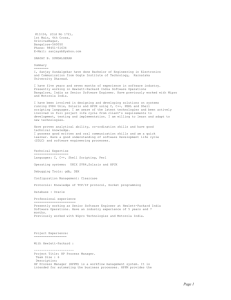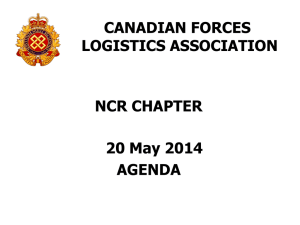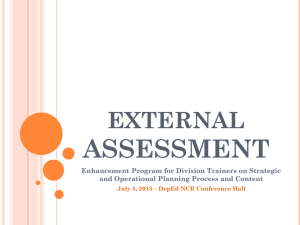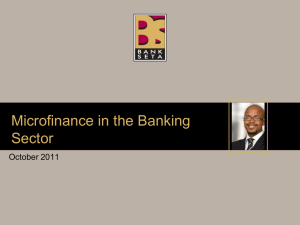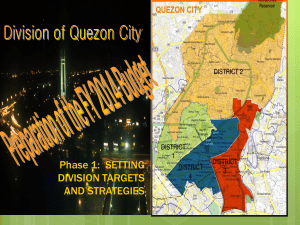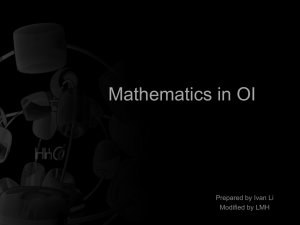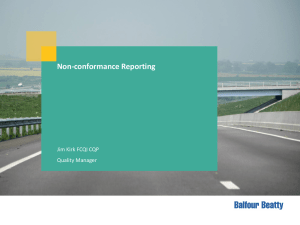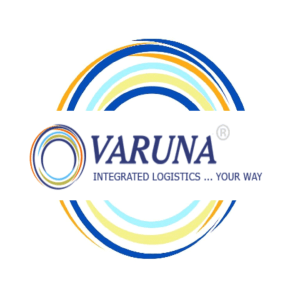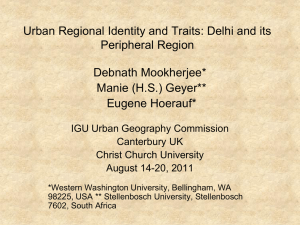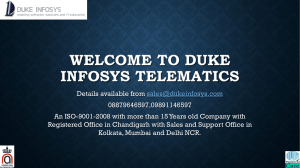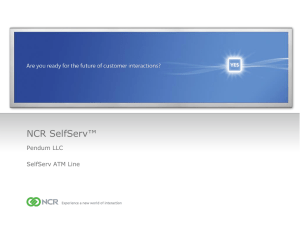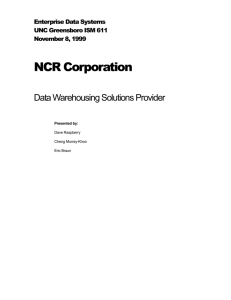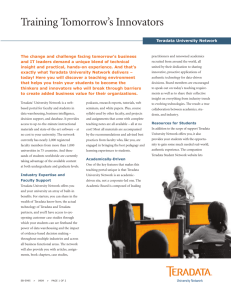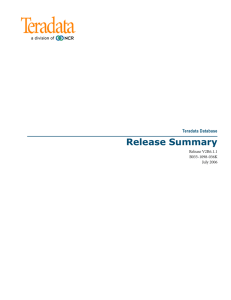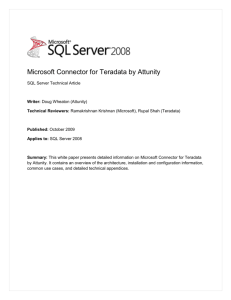Case PowerPoint slides
advertisement
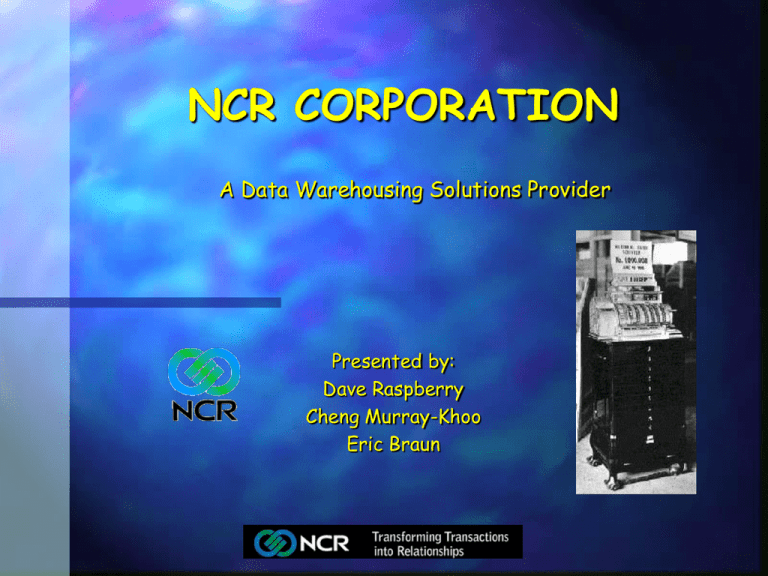
NCR CORPORATION A Data Warehousing Solutions Provider Presented by: Dave Raspberry Cheng Murray-Khoo Eric Braun NCR Overview Founded in 1884 by John Patterson Began as a cash register company, entered the computer business in 1960 Bought in 1990 by AT&T, later divested Purchased Teradata Corporation in the late eighties NCR Overview Based on Teradata and products based on the Intel chip, began the platform known as the WorldMark series Subsequently, Data Warehousing is becoming the dominant business in NCR’s product line Now pursuing an across-the-board approach to customers--large and small How is NCR different? Utilizes Parallel Processing and ER logical modeling – the only fully parallel solution on the market featuring parallel loading, processing, and archiving Strategic approach based on three factors: – Performance – Scalability – Ease of Setup and Support Parallel Processing- some lessons learned Divide the rows evenly Optimize the SQL requests Provide a scalable interconnect Load and restore data Provide for easy system administration Scalable Data Warehouse Framework When building a data warehouse, NCR’s approach involves areas throughout the organization, IT resources, the technologies, the processes, and the businesses SDW accommodates independent data marts or directly building a DW with dependent data marts Recommends beginning with a small scalable data warehouse, focusing on one or two area. Scalable Data Warehouse Framework There are four dimensions of the scalable system – The ability to input and extract data with consistent response times – The number of users or queries that can be run simultaneously – The environmental complexity of the data model and the queries being run against the model – The degree of support needed to maintain scalability NCR’s Logical Data Model Philosophy NCR believes star schema’s limit business intelligence During modeling process, prefers Third Normal Form Denormalizing helps the DBMS, but hurts the quality of information Third normal form avoids data integrity compromises NCR’s Logical Data Model The four hardest things for a database to do: – – – – Join Tables Aggregate Data Sort Data Scan large amounts of data WorldMark Servers Four generations of large and medium scale servers Optimized for Teradata architecture and Bynet technology WorldMark 4800 and 5200 operate on Intel chip technology 4800 is scalable, and designed to run on applications from 50 GB to 1 TB Can be upgraded to the WorldMark 5200 Designed for large scale data warehousing, 400GB to 100TB Teradata Relational Database Management System (RDBMS) Most powerful decision support parallel relational database. Realistically support data warehouses in excess 500 gigabytes of user data. WHAT MAKE NCR TERADATA SO SPECIAL? Teradata runs on Symmetric Multiprocessing (SMP) hardware platform Each access module process (AMP) as one processor. Each AMP executes the query functions and data management. Each AMP controls and maintains a portion of database stored on the disks, TASKS CAN PERFORM IN PARALLEL as assigned by VNET. Each AMP acts as a “unit of parallelism”. Teradata’s Unconditional Parallelism NCR’s Teradata patented “shared nothing” architecture. AMP Teradata runs on Massively Parallel Processing (MPP) hardware platform Interconnect that coordinates and synchronizes the activities of a large number of SMP nodes Scalability - the cornerstone of Teradata RDBMS BYNET design can linearly scale to support up to 4096 SMP nodes on a single system. Database Capacity: 128 Terabytes of data 1, 024 SMP nodes 32, 768 physical processors NCR Scalable Data Warehouse NCR handles the world’s biggest data warehouse for decision support without compromising the data integrity by denormalizing the tables. NCR is the only vendor in the market utilizing parallel processing with ER logical modeling. NCR’s Alliance Partners NCR’s Strategies Customer Privacy – Claims to be the first solutions firm to place customer privacy at the center of its strategy – New database products from NCR will enable marketers to add a customer's personal preference on how their data should be used Neighborhood Retailing Customer Management Solutions Customer Relationship Management How Do Customers Benefit From NCR? Retailers analyze their profitability on a product, customer, and store-level basis Banks use NCR's data warehousing to separate the profitable customers from the freeloaders Supermarkets are working on an automated pricing system for every item in the store In the communications industry, NCR provides much needed information management and the ability to bring new products to market quickly. NCR Customer’s Complaints Databases from Oracle, IBM and Microsoft are quickly adding all the features that perform sophisticated requests on multiterabyte data-warehouses Changing ownership and leadership NCR’s size Competition and Problems Competition: Andersen Consulting, EDS, IBM, and Unisys Still trails Oracle, Compaq Computer, IBM and HewlettPackard in data warehouse sales Core business in computer systems is declining by almost 30% a year and data warehouse sales haven’t picked up the slack NCR relies on international markets for 60% of its revenue Stock price has dropped nearly 50% over the last four months Conclusion and Future Outlook Now dedicated to becoming the leader in data warehousing Focused on putting together a solid strategy to help businesses understand who their customers are and how best to serve them Outsources to Solectron nearly everything it used to manufacture itself, resulting in great cost savings Forecast six to ten acquisitions in the $20 million to $100 million range in the near future Possess the needed technology and assets Planning initiatives in e-commerce NCR Questions…?

